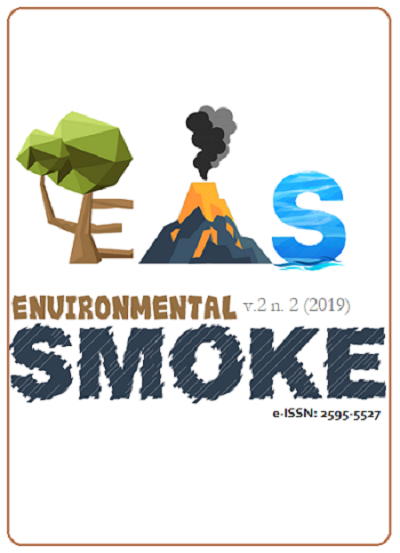AGROECOLOGIC TRANSITION IN RURAL PROPERTIES FROM THE SOUTH COAST FROM JOÃO PESSOA CITY, NORTHEAST BRAZIL
Views: 718DOI:
https://doi.org/10.32435/envsmoke.20192272-77Keywords:
Agropecuary, Conventional, AgroecosystemAbstract
Nowadays, the world's agriculture and livestock is undergoing transformations, where the population's appeal for an agricultural activity based on a more ecological basis is increasing giving a better quality of life to all involved, a technique that can be defined as a science, with a multidisciplinary character that has concepts, principles and methodologies, which serves to analyze and evaluate agroecosystems. Thus, in order to focus on the field reality of the rural area of the city of João Pessoa, Paraíba, located in the southern coastal area, a research was developed between properties that use the two systems of agriculture, using for that purpose the bibliographic review, qualitative research and participant observation. In the end of this work, it was observed that family traditions and the rapid return of investments in the field with the conventional agriculture and livestock hindered the implementation of a more agro-ecosystem activity which leads the extension agents to extend their work and extension techniques.Downloads
References
ALTIERI, M.A. Biotecnologia Agrícola: mitos, riscos ambientais e alternativas. Porto Alegre: ASCAR-EMATER/RS, 2002.
ALTIERI, M.A. Biotecnologia Agrícola: mitos, riscos ambientais e alternativas. Petrópolis: Vozes, 2004.
CARDOSO, I.M.; FERRARI, E.A. Construindo o conhecimento agroecológico: trajetória de interação entre ONG, universidade e organizações de agricultores. Agriculturas, v. l3, p. 28-32, 2006.
CÓRDULA, E.B.L.; NASCIMENTO, G.C.C.; FURTADO, G.D.; ABÍLIO, F.J.P. Etnografia dos agricultores de um assentamento agrícola, no município de Lucena, estado da Paraíba. Revista Educação Ambiental em Ação, n. 66, ano, XVII, 2018.
CÓRDULA, E.B.L.; NASCIMENTO, G.C.C.; FURTADO, G.D.; ABÍLIO; F.J.P. A relação do ser humano com a natureza, em um assentamento agrícola no município de Lucena, Paraíba. Revista Educação Ambiental em Ação, n. 67, ano, XVII, 2019.
DIAS, T.F. Agricultura Convencional e Agricultura Ecológica: um debate sobre a sustentabilidade de um novo sistema agrícola. III Simpósio de Excelência em Gestão e Tecnologia, Resende, III SEGeT, 2006.
GIL, A.C. Como elaborar projetos de pesquisa. ed. 4, São Paulo, Atlas, 2002.
RAUPP, F.M.; BEUREN, I.M. Metodologia da pesquisa aplicável às ciências sociais. In. BEUREN, I.M. (Org.). Como elaborar trabalhos monográficos em contabilidade: teoria e prática. ed. 3, São Paulo: Atlas, cap. 3, p.76-97, 2006.
SANTOS, A.S. Resistências culturais como estratégias de defesa da identidade. Salvador, IV ENECULT, 2008.
SILVA, D.A.; FURTADO, G.D.A resistência dos agricultores em aderir a transição agroecológica em propriedades rurais assistidas pela DAF em João Pessoa/PB. ANAIS do X – ENFOC. Curitiba, PA, 2013.
VALLADARES, L. Os dez mandamentos da observação participante. Revista brasileira de Ciências Sociais, v. 22, n. 63, p. 153-155, 2007.
Downloads
Published
How to Cite
Issue
Section
License
The copyright for manuscripts published in Environmental Smoke belongs to the author, with first publication rights for the journal. The published articles are of total and exclusive responsibility of the authors.
































































